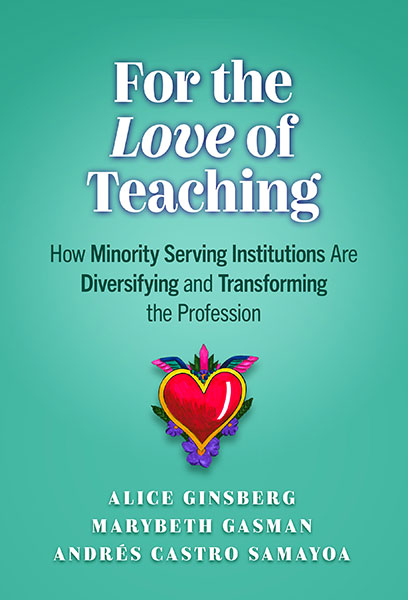Professors: Request an Exam Copy
Print copies available for US orders only. For orders outside the US, see our international distributors.
Alice Ginsberg, Marybeth Gasman, Andrés Castro Samayoa
Publication Date: March 24, 2023
Pages: 144

There remains a significant achievement gap for students of color across the K–12 spectrum. One area that needs increased and immediate attention is how we recruit, prepare, and retain teachers of color. This book asks: Why do teachers of color choose teaching? What are their expectations for the students they will teach? How do their past experiences shape their vision of teachers as role models, mentors, and advocates for children of all races and cultures? The authors detail how Minority Serving Institutions (MSIs)—nearly 800 colleges and universities across the nation that educate nearly 45% of all students of color—are preparing culturally proficient teachers using new methods centered on integrating culturally relevant pedagogy, creating a culture of belonging through faculty engagement and cohort models, enriching student teaching and clinical practice through residencies and school–university partnerships, and working closely with families and communities. Addressing timely and critical issues of educational equity, For the Love of Teaching is a call to action for all colleges and university to improve their teacher education programs.
Book Features:
Alice E. Ginsberg is a Senior Research Specialist in the Graduate School of Education at Rutgers University. Marybeth Gasman is the Samuel DeWitt Proctor Endowed Chair in Education and Distinguished Professor in the Department of Educational Psychology at Rutgers University. Andrés Castro Samayoa is an assistant professor in the Department of Educational Leadership and Higher Education at Boston College.
“For the Love of Teaching paints an intimate portrait of brilliance, hard work, and promise at MSI teacher education programs. Readers learn how these mighty institutions bring about a more ethical and just education world.”
—Emery Petchauer, professor, Michigan State University
Contents
Preface: Love and Teaching ix
Acknowledgments xi
Introduction: What’s Love Got to Do With It? 1
1. Teacher Education and Diversity: Information vs. Transformation 7
History of Diversity and Racial Equity in Teacher Education 7
Access to Higher Education for Students of Color Interested in Teaching 11
“The Overwhelming Presence of Whiteness” in Teacher Education Programs 12
Lack of Program Coherence 16
High Stakes Entry and Certification Exams 18
Recruitment and Retention of Teachers of Color in Hard-to-Staff Schools 19
2. “A Story to Tell”: Who Are Minority Serving Institution Teacher Educators and Teacher Candidates? 21
Tulia 23
Jeanne 25
Rafael 26
Alba, Camila, and Elmira 28
Cortez 30
Dean 32
Kim 33
Seth 35
3. Changing the Narrative: What Does Culturally Relevant Pedagogy Look Like in Action? 38
What Is Culturally Relevant Pedagogy? 40
Culturally Relevant Pedagogy and MSIs 42
A Place of Hope and Healing: Culturally Relevant Pedagogy at Stone Child College 44
Every Step Forward Sea Con Paso Firme: Stories and Images of Teaching in California’s Central Valley 49
“You Can’t Sit Behind a Desk”: Visibility and Black Role Models at Jackson State University 53
Culturally Relevant Pedagogy as Community Analysis 58
4. “Belonging”: Faculty Support and Cohort Models in MSI Teacher Education Programs 62
Like Family 63
“Not Just a Number”: Personalized and Holistic Faculty Care 64
Peer Leadership and Support: MSI Cohort Models 67
My Brother’s Keeper: Cohorts and Call Me MISTER at Jackson State University 69
“They Were Us”: Cohorts and the Mini Corps Program at California State University, Fresno 73
5. “Homegrown”: Teacher Residencies and University–School Partnerships 77
So, What’s Wrong With Student Teaching? 80
“We Were There from the Beginning”: California State University, Fresno’s Rural Residency Program 84
“Their Time in the Classroom Is Just as Important as Mine”: New Mexico State University’s Blocks Program 88
6. Where Wisdom Sits: Teacher Preparation and Community Engagement 93
Home Visits 94
Community Service 96
Parental Education 97
Field Trips 98
Inquiry, Action Research, and Advocacy 100
7. A Call to Action 105
Diversify the Teaching Profession 105
Integrate Culturally Relevant Pedagogy 105
Expand Student Teaching and Clinical Practice 106
Recruit Former K–12 Teachers to the Faculty 107
Promote Cohort Models 107
Provide Wraparound Candidate Support 107
Foster Community Engagement 108
Respect the Teaching Profession 108
Communicate Messages of Success 108
Consider the Importance of Love 109
Final Thoughts 111
Appendix A: The Study 113
Notes 117
References 119
Index 127
About the Authors 131
Professors: Request an Exam Copy
Print copies available for US orders only. For orders outside the US, see our international distributors.